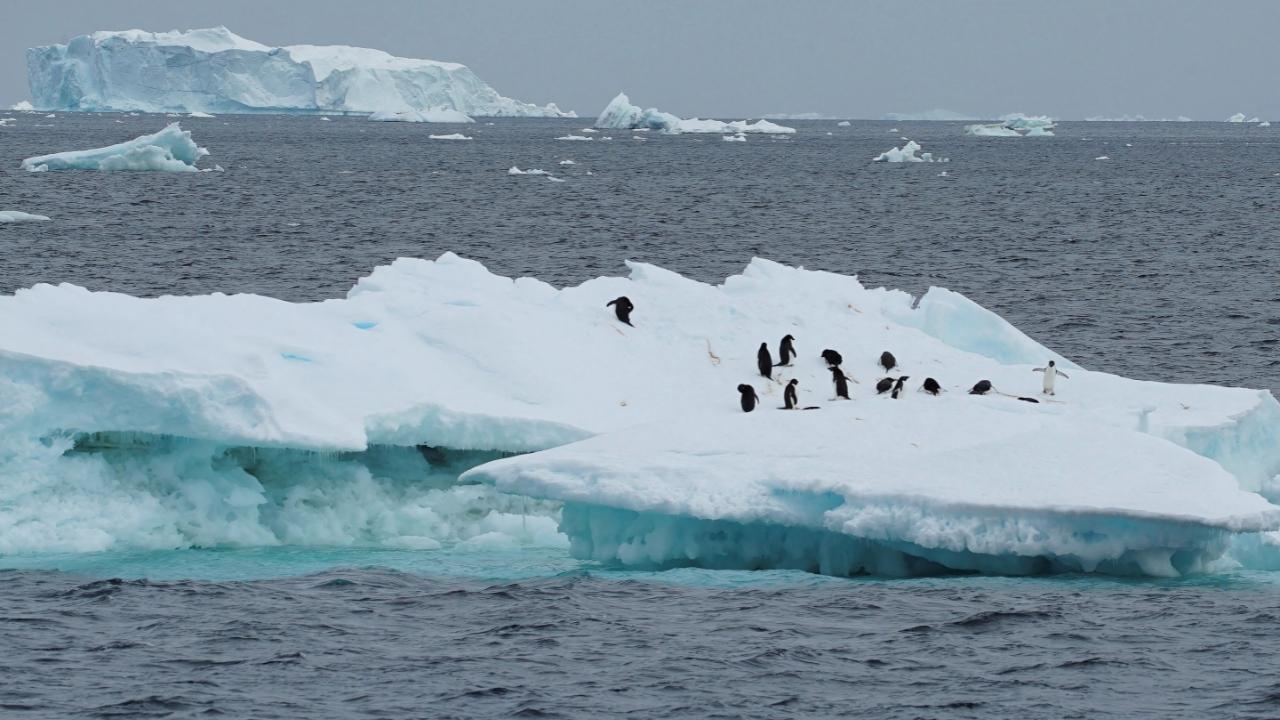
Post by : Priya
Photo:Reuters
In 2025, the Arctic sea ice has reached an unprecedented low level, setting a new record low maximum extent in the 47-year satellite observation history. Recorded at just about 14.33 million square kilometers on March 22, this is the smallest winter sea ice cover ever observed by scientists since satellite monitoring began in 1979. This extent is 1.31 million square kilometers below the average maximum recorded from 1981 to 2010 and marks a worrying continuation of a decades-long trend of diminishing Arctic ice.
What Does This Record Low Mean?
Sea ice in the Arctic expands during the winter months and melts during summer. The maximum sea ice extent typically occurs around March, protecting the planet by reflecting sunlight and helping regulate temperatures globally. The decline from past average levels means less reflective ice, contributing directly to increased heat absorption by the ocean and accelerating global warming. This feedback loop risks severe consequences worldwide, affecting weather, ecosystems, and sea levels.
Significantly, the 2025 maximum occurred 10 days later than the historical average peak date of March 12, showing not only a decline in ice area but changes in seasonal patterns. The extent is lower than previous record lows set in recent years such as 2017, 2018, and 2016, showing an alarming acceleration in ice loss.
Recent Seasonal Trends and Variations
Scientific observations found variability in the Arctic ocean regions. While areas like the East Greenland Sea showed near-average ice cover during the winter, others such as the Bering Sea and the Sea of Okhotsk had much lower ice coverage. Due to warmer-than-average temperatures (1–2°C above normal), the formation of ice was delayed and diminished in several parts of the Arctic, including the delayed freeze over Hudson Bay and smaller, less dense drift ice floes near Hokkaido, Japan.
Antarctic Ice Also Declines
While the Arctic experiences winter maximum sea ice minimums, the Antarctic—located in the Southern Hemisphere—also saw significant ice loss during its summer period. The Antarctic sea ice retreated to about 1.98 million square kilometers on March 1, 2025, tying for its second-lowest minimum ever recorded. This loss is about 30% below levels typically seen before 2010, highlighting that polar ice melt is a global issue, not merely an Arctic one.
Why Is Arctic Sea Ice Shrinking?
The decline in Arctic sea ice is primarily driven by the global increase in temperature due to human-induced climate change. Emissions of greenhouse gases from cars, industries, energy production, and deforestation trap heat in the atmosphere. This warming leads to less sea ice being formed during winter and more melting in summer. The loss of multi-year ice—the thicker ice that survives multiple seasons—makes the Arctic even more vulnerable to future warm spells.
The Wider Impact of Arctic Ice Loss
The diminishing ice has repercussions far beyond the polar region:
Rising Sea Levels: Melting ice contributes to rising ocean levels, threatening coastal communities worldwide.
Changing Weather Patterns: The Arctic influences global weather; reduced ice alters atmospheric circulation and can cause extreme weather events such as cold winters or heatwaves in distant regions.
Threat to Wildlife: Species dependent on ice, such as polar bears, seals, and certain birds, face habitat loss and survival challenges.
Economic and Geopolitical Implications: New shipping routes open but also raise environmental and territorial concerns.










Kazakhstan Boosts Oil Supply as US Winter Storm Disrupts Production
Oil prices inch down as Kazakhstan's oilfield ramps up production, countered by severe disruptions f

Return of Officer's Remains in Gaza May Open Rafah Crossing
Israel confirms Ran Gvili's remains identification, paving the way for the Rafah border crossing's p

Border 2 Achieves ₹250 Crore Globally in Just 4 Days: Sunny Deol Shines
Sunny Deol's Border 2 crosses ₹250 crore in 4 days, marking a significant breakthrough in global box

Delay in Jana Nayagan Release as Madras HC Bars Censorship Clearance
The Madras High Court halts the approval of Jana Nayagan's censor certificate, postponing its releas

Tragedy Strikes as MV Trisha Kerstin 3 Accident Leaves 316 Rescued
The MV Trisha Kerstin 3 met an unfortunate fate near Jolo, with 316 passengers rescued. The governme

Aryna Sabalenka Advances to Semi-Finals, Targeting Another Grand Slam Title
Top seed Aryna Sabalenka triumphed over Jovic and now faces Gauff or Svitolina in the semi-finals as